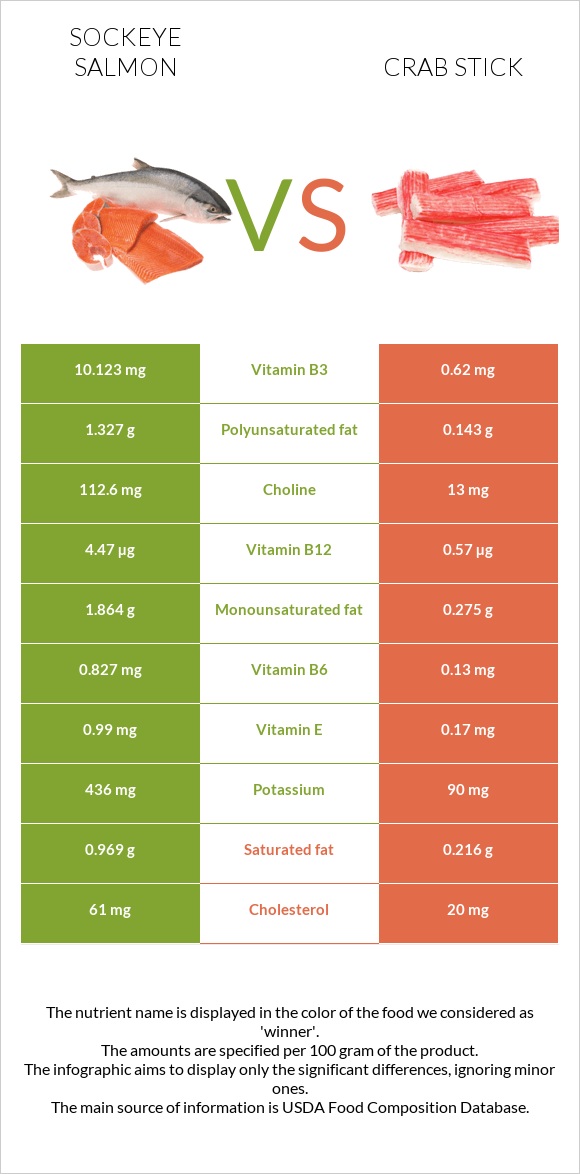Sockeye salmon vs. Crab stick — In-Depth Nutrition Comparison
Compare
The main differences between sockeye salmon and crab stick
- Sockeye salmon is richer than crab stick in vitamin B12, vitamin D, vitamin B3, vitamin B6, vitamin B5, selenium, choline, and vitamin B2.
- Daily need coverage for vitamin B12 for sockeye salmon is 163% higher.
- Crab stick contains less cholesterol.
- Sockeye salmon has a lower glycemic index than crab stick.
Food types used in this article are Fish, salmon, sockeye, cooked, dry heat and Crustaceans, crab, alaska king, imitation, made from surimi.
Infographic

Infographic link
Mineral Comparison
Mineral comparison score is based on the number of minerals by which one or the other food is richer. The "coverage" charts below show how much of the daily needs can be covered by 300 grams of the food.
| Contains more PotassiumPotassium | +384.4% |
| Contains more IronIron | +33.3% |
| Contains more CopperCopper | +137.5% |
| Contains more ZincZinc | +66.7% |
| Contains less SodiumSodium | -82.6% |
| Contains more ManganeseManganese | +18.2% |
| Contains more SeleniumSelenium | +59.2% |
| Contains more MagnesiumMagnesium | +19.4% |
| Contains more CalciumCalcium | +18.2% |
Vitamin Comparison
Vitamin comparison score is based on the number of vitamins by which one or the other food is richer. The "coverage" charts below show how much of the daily needs can be covered by 300 grams of the food.
| Contains more Vitamin AVitamin A | +∞% |
| Contains more Vitamin EVitamin E | +482.4% |
| Contains more Vitamin DVitamin D | +∞% |
| Contains more Vitamin B1Vitamin B1 | +423.3% |
| Contains more Vitamin B2Vitamin B2 | +207.5% |
| Contains more Vitamin B3Vitamin B3 | +1532.7% |
| Contains more Vitamin B5Vitamin B5 | +∞% |
| Contains more Vitamin B6Vitamin B6 | +536.2% |
| Contains more Vitamin B12Vitamin B12 | +684.2% |
| Contains more FolateFolate | +∞% |
| Contains more Vitamin KVitamin K | +300% |
All nutrients comparison - raw data values
| Nutrient |  |
 |
DV% diff. |
| Vitamin B12 | 4.47µg | 0.57µg | 163% |
| Vitamin D | 670 IU | 0 IU | 84% |
| Vitamin D | 16.7µg | 0µg | 84% |
| Vitamin B3 | 10.123mg | 0.62mg | 59% |
| Vitamin B6 | 0.827mg | 0.13mg | 54% |
| Protein | 26.48g | 7.62g | 38% |
| Vitamin B5 | 1.274mg | 0mg | 25% |
| Selenium | 35.5µg | 22.3µg | 24% |
| Sodium | 92mg | 529mg | 19% |
| Choline | 112.6mg | 13mg | 18% |
| Cholesterol | 61mg | 20mg | 14% |
| Vitamin B2 | 0.246mg | 0.08mg | 13% |
| Vitamin B1 | 0.157mg | 0.03mg | 11% |
| Potassium | 436mg | 90mg | 10% |
| Fats | 5.57g | 0.46g | 8% |
| Polyunsaturated fat | 1.327g | 0.143g | 8% |
| Vitamin A | 58µg | 0µg | 6% |
| Carbs | 0g | 15g | 5% |
| Copper | 0.076mg | 0.032mg | 5% |
| Vitamin E | 0.99mg | 0.17mg | 5% |
| Monounsaturated fat | 1.864g | 0.275g | 4% |
| Calories | 156kcal | 95kcal | 3% |
| Phosphorus | 305mg | 282mg | 3% |
| Saturated fat | 0.969g | 0.216g | 3% |
| Magnesium | 36mg | 43mg | 2% |
| Iron | 0.52mg | 0.39mg | 2% |
| Fiber | 0g | 0.5g | 2% |
| Zinc | 0.55mg | 0.33mg | 2% |
| Folate | 7µg | 0µg | 2% |
| Starch | 0g | 3.5g | 1% |
| Fructose | 0g | 0.62g | 1% |
| Net carbs | 0g | 14.5g | N/A |
| Calcium | 11mg | 13mg | 0% |
| Sugar | 0g | 6.25g | N/A |
| Manganese | 0.013mg | 0.011mg | 0% |
| Vitamin K | 0.1µg | 0.4µg | 0% |
| Trans fat | 0.023g | 0.008g | N/A |
| Tryptophan | 0.335mg | 0.075mg | 0% |
| Threonine | 1.247mg | 0.285mg | 0% |
| Isoleucine | 1.274mg | 0.23mg | 0% |
| Leucine | 2.185mg | 0.607mg | 0% |
| Lysine | 2.574mg | 0.707mg | 0% |
| Methionine | 0.858mg | 0.261mg | 0% |
| Phenylalanine | 1.086mg | 0.26mg | 0% |
| Valine | 1.461mg | 0.286mg | 0% |
| Histidine | 0.711mg | 0.156mg | 0% |
| Omega-3 - EPA | 0.299g | 0g | N/A |
| Omega-3 - DHA | 0.56g | 0.028g | N/A |
| Omega-3 - ALA | 0.008g | N/A | |
| Omega-3 - DPA | 0.093g | 0.001g | N/A |
| Omega-6 - Eicosadienoic acid | 0.019g | 0g | N/A |
| Omega-6 - Linoleic acid | 0.089g | N/A |
Macronutrient Comparison
Macronutrient breakdown side-by-side comparison
Protein:
26.48 g
Fats:
5.57 g
Carbs:
0 g
Water:
67.33 g
Other:
0.62 g
Protein:
7.62 g
Fats:
0.46 g
Carbs:
15 g
Water:
74.66 g
Other:
2.26 g
| Contains more ProteinProtein | +247.5% |
| Contains more FatsFats | +1110.9% |
| Contains more CarbsCarbs | +∞% |
| Contains more WaterWater | +10.9% |
| Contains more OtherOther | +264.5% |
Fat Type Comparison
Fat type breakdown side-by-side comparison
Saturated fat:
Sat. Fat
0.969 g
Monounsaturated fat:
Mono. Fat
1.864 g
Polyunsaturated fat:
Poly. Fat
1.327 g
Saturated fat:
Sat. Fat
0.216 g
Monounsaturated fat:
Mono. Fat
0.275 g
Polyunsaturated fat:
Poly. Fat
0.143 g
| Contains more Mono. FatMonounsaturated fat | +577.8% |
| Contains more Poly. FatPolyunsaturated fat | +828% |
| Contains less Sat. FatSaturated fat | -77.7% |





